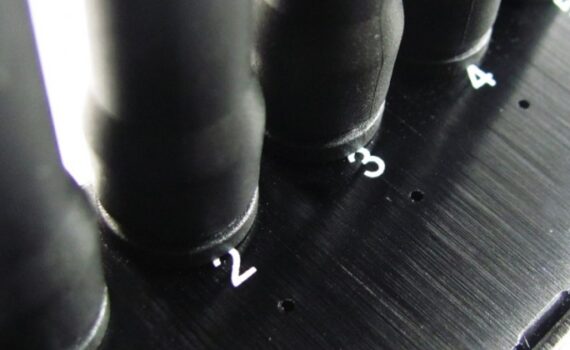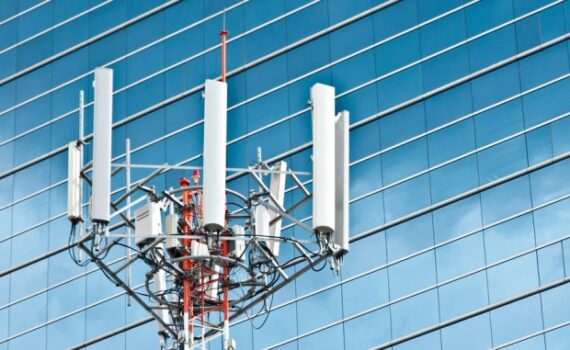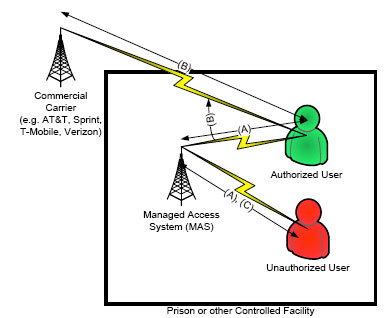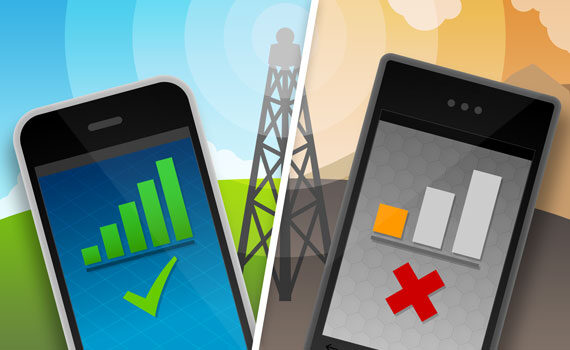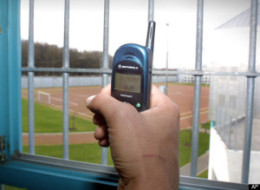Prisons want jamming technology to stop criminal activity, but critics warn there would be dire consequences if jamming was allowed to propagate. In June the Department of Justice released a report that declared a solution to prevent criminal activity from happening within prisons: it successfully tested a jammer that would block mobile signals from smuggled cell phones inside a Maryland prison. Throughout the corrections world the news spread fast. For South Carolina Corrections director Brian […]
managed access
According to the DOJ, the National Telecommunications and Information Administration (NTIA) has posted a report detailing its findings from the Jan. 17, 2018 test of micro-jamming technology conducted at the Federal Correctional Institution at Cumberland, Maryland. Data from the test show that the micro-jammer’s signal disrupted commercial wireless signals inside the prison cell, which meant that if cellphones were operating inside the cell, they would have been rendered inoperable. At 20 ft. and 100 ft. […]
T-Mobile recently submitted to the FCC a study comparing Managed Access Systems (“MAS”) and precision jamming systems (micro-jamming) as potential solutions to prevent contraband phone use in correctional facilities. This study was submitted to Docket 13-111, Promoting Technological Solutions to Combat Contraband Wireless Device Use in Correctional Facilities. The study provides an overview of MAS and micro-jamming solutions examining both technical and cost considerations. The paper finds that the cost to deploy and operate the […]
Recently meshIP, LLC submitted comments to the FCC’s Docket No. 13-111, Promoting Technological Solutions to Combat Contraband Wireless Device Use in Correctional Facilities. We are re-posting those comments here: Introduction meshIP, LLC (“meshIP” or “Company”) respectfully submits these comments in response to the Federal Communications Commission’s (“FCC” or “Commission”) Report & Order and Further Notice of Proposed Rulemaking (“FNPRM”) in the above- captioned proceeding. meshIP is the provider of meshDETECT© Secure Prison Cell Phone Solutions™. meshDETECT© […]
After last year’s announcement by the CDCR that they would halt the deployment of the managed access systems touted to stop the supply of contraband cell phones into California’s state prisons, the Department of Corrections and Rehabilitation has now announced it is installing 272 more metal detectors, 68 X-ray machines to scan packages, 103 low-dose X-ray scanners, 170 hidden surveillance cameras, 34 devices to decrypt and analyze cellphones, and 272 scanners that detect magnetic signals […]
An interesting article in light of the recent letter submitted to the FCC by ten Republican governors who want the Federal Communications Commission to give states more autonomy to apply technology that can stop prison inmates from using smuggled cellphones. Gov. Nikki Haley and her counterparts encouraged FCC Chairman Thomas Wheeler in a letter Monday to give them “flexibility and authority” to render such communication impossible. While the letter doesn’t explicitly say so, what the […]
This news tracks with reports elsewhere that this technology to block cell phone usage in prisons is problematic. An effective contraband cell phone strategy should focus on reducing demand, in addition to restricting supply. Corrections officials have shared with us the fact that at least 40% of the calls intercepted by these systems are to phone numbers on inmates’ approved calling lists. We suspect that an even higher percentage are to other family and loved […]
A cautionary tale for prisons contemplating shelling out millions of dollars for managed access systems to jam contraband cell phones. A prison in New Zealand has spent over $11M (US) in installation and upgrades on a cellular signal jamming system that has not prevented the ongoing use of wireless devices. Taxpayers have forked out $17 million on cellphone jamming technology for prisons – but inmates continue to be caught with increasing numbers of contraband mobile […]
A Texas Tribune investigation has found that few inmates or correctional officers face legal consequences for smuggling cellphones even as prison officials have intensified efforts to keep the devices out of prisons. Just 5 percent of cellphone smuggling cases investigated by the Criminal Justice Department’s Office of Inspector General from 2009 to 2013 resulted in a criminal sentence, according to documents obtained from the office through a public information request. Some notable excerpts from the […]
The United Kingdom’s Ministry of Justice has determined that managed access jamming of contraband cell phones is too expensive and has commissioned “research to explore the use and demand for illicit mobile phones amongst the prison population” in order to facilitate the “development of a new mobile phone strategy to: (i) manage prisoner communications, (ii) reduce and control criminal activities and (iii) reduce expenditure on equipment and the need for time-consuming searches.” The aim […]
As we have written before, managed access cell phone jamming systems being tested in prisons around the world have been deployed with mixed results. In addition to requiring ongoing management and investment post deployment, they have a spotty record and not all vendor’s equipment works as advertised. Recently, the Cayman Islands issued a report on their managed access trial. According to the report, which is discussed in the article below, “The prisons service installed a […]
An Australian-first trial of technology that will stop inmates from making calls from mobile phones they’ve illegally smuggled into jail has begun at a prison west of Sydney. The project trials the use of a Distributed Antenna System (DAS) to jam phones within the prison under the supervision of the ACMA and mobile phone carriers. The DAS system will jam the channels transmitting mobile phone signals within the prison but prevent disruption outside the prison. […]
According to a recent article, managed access systems (MAS) are not plug and play. They require ongoing systems management and staff time. This means ongoing cost, in addition to the high cost and operational challenges of installation. The Mississippi State Penitentiary in Parchman was the first prison in the country to use the Intelligent Network Access Controller (iNAC), which blocks service for contraband cell phones inside the prison walls. Being on the cutting edge involved […]
Update: We have submitted our thoughts on this complex issue to the FCC. You can read them here and download the actual filing here. The FCC today issued FCC 13-58, Contraband Wireless Device Notice of Proposed Rulemaking (NPRM), to “remove barriers to the deployment and viability of existing and future technologies used to combat contraband wireless devices.” The NPRM discusses current technologies such as managed access, detection, jamming and wireless carrier service termination of identified […]
Since the first high profile prison managed access system (MAS) jammer deployment to thwart contraband cell phones at the MDOC facility in Parchman, MS., state departments of correction around the country have been evaluating the technology for potential deployment. The California Department of Corrections and Rehabilitation (CDCR) announced a statewide deployment of cell phone jammers, despite high profile concerns about their effectiveness. And recently, Texas and Maryland moved to test the technology in their prison […]
The American Correction Association has an article on its website summarizing the recent meeting of the newly-formed No Cells in Cells Coalition on Oct. 23, 2012, at the ACA headquarters to discuss the problem of contraband cell phones smuggled into prisons. Attendees included representatives from the Delaware Department of Corrections, the Maryland Department of Public Safety and Correctional Services, the Virginia Department of Corrections, the American Jail Association, the National Organization for Victim Assistance, the […]
Update (10/19/12): The Avanal cell phone Managed Access System (MAS) system is scheduled to go live on Monday October 22nd. Very soon, inmates at Avenal won’t hear a dial tone if they try to make an outgoing call. Instead, they’ll hear: “The cellular device that you are using at Avenal State Prison has been identified as contraband. It is illegal to possess.” Avenal flips the switch Monday, and will be the first facility to block […]
This article discusses the TDCJ’s decision to investigate the viability of managed access contraband cell phone jamming. California, Mississippi and Maryland are also testing the technology. The impact of smuggled contraband cell phones in prisons has been significant. As the article states, “A couple of years ago, there were long lines at the pay phones—hours long. By this year, no one was using them, there were so many smuggled cell phones.” Update (3/15/13): Final testing […]
As we have written previously, the CDCR has forgone all prison telephone commissions as part of a new contract with Global Tel*link (GTL) in return for GTL installing managed access signal (MAS) jamming systems in all 33 of the CRDR’s prison facilities. However, the California Council on Science and Technology (CCST) released a report today advising the State of California to use security screening systems, similar to those in airports, in state prisons before investing […]
Continuing a trend to fight contraband cell phones in prisons through the deployment of managed access cell phone signal jammers, Maryland has become the latest state to investigate the technology. Maryland has received a federal grant to help fight cell phone use in prisons. The Maryland Department of Public Safety and Correctional Services announced a $2 million contract over three years with Columbia, Md.-based Tecore Networks to deploy technology known as managed access. The system […]
The CDCR recently issued a bid for its inmate telephone services and made the installation of wireless managed access jamming systems in its prisons a requirement for the bidders. Global Tel*Link (GTL) has won that bid and will therefore be bearing the cost of installing these systems. Given the high cost of this selective jamming technology and GTL’s commitment not to raise the cost of calls for prisoners, either the CDCR is taking a much […]
The use of wireless jammers to block contraband prison cell phones is one of the many supply-side initiatives being investigated and deployed in prisons around the world. As shown by these news items, this frequently results in the loss of cellular service for the homes and businesses located near the prisons. This calls into question the viability of using this technology to eliminate the use of contraband cell phones. Recently, in response to reports of […]
An article discussing the steps the Mississippi DOC is taking to address the supply of contraband cell phones in its prisons. According the Department of Corrections Commissioner Christopher Epps, “Cell phones are the biggest contraband items that we have. It’s a national problem in corrections.” The article also discuss the managed access wireless signal jammer installed at the Parchman facility. The system has blocked about 1.8 million illegal cell phone calls and text messages. The […]
An interesting overview of the problems smuggled cell phones in prison create in jails throughout the United States. As usual however, the discussion of possible solutions focuses on reducing supply and signal jamming, but offers no consideration of a strategy reducing the DEMAND for contraband cell phones. By co-opting prisoners’ legitimate desire for more frequent and easier telephone access to family, prisons can reduce the overall demand for contraband cell phones and reduce the incentive […]
An article describing some of the technical problems with contraband cell phone jamming in a prison. Unlike the managed access systems used in the United States, this Cayman Islands implementation blocks all cellular signals. Except, it doesn’t. According to the article, “Government officials confirmed Wednesday the cell jamming equipment had not been working in all areas of the prison or at certain times, largely due to the proximity of a telecommunications tower next to the […]
No technology is perfect, and that includes cell phone jamming technology. The real issue here is how compromised is the wireless blocking system installed at Parchman to combat contraband cell phones? The meshDETECT secure cell phone service has no internet access available so prisoners cannot access Facebook or Twitter. An inmate inside a Mid-South prison has been able to take pictures and post them online, despite a high-tech blocking technology put in place to keep […]
This article discusses the problem of illegal prison cell phones in the State of Texas. As with most states, the initial approach to deal with the problem is to try jamming contraband prison cell phones. The cost of this approach has yet to be quantified however. State corrections officials said Friday that a test of cell phone detection technology at a Southeast Texas prison where an inmate used a contraband phone when he escaped last […]






